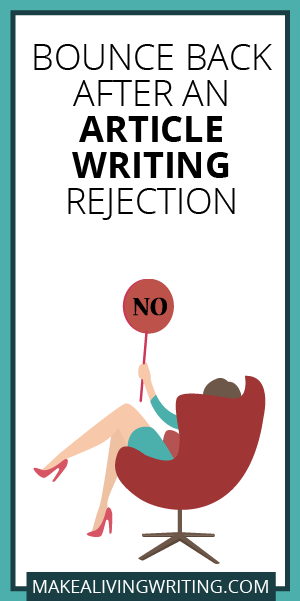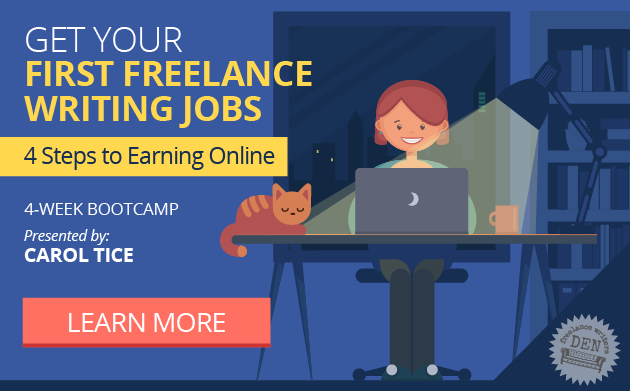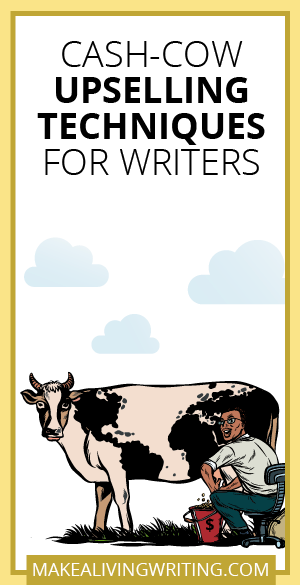 New freelance writers have a lot of worries. So I want to check in about that.
New freelance writers have a lot of worries. So I want to check in about that.
Are you frozen in fear, and not taking any steps to get your freelance-writing career off the ground?
Usually, that means fear has you stuck.
The good news is, a lot of worries newbies have are completely unfounded.
Today, let’s bust those fears. What you’re worried about probably isn’t an issue at all.
Wonder what I mean? Let me list the top five irrational fears new freelance writers tell me they’re plagued by — and I’ll show you that you don’t have to worry about any of them. You’re good to go!
Ready?
1. I’m not an expert
This has to be the biggest myth out there, that you have to be an expert in something to write about it. Let me tell you about some of the things I’ve written about — and my lack of innate knowledge about them:
- I’ve written cover features for the Los Angeles Times‘ real estate section, but am not a real estate broker or mortgage lender.
- I’ve been Entrepreneur magazine’s tax columnist. And am not a former CPA.
- I just wrote a 100-page e-book all about crowdfunding, but have never done a crowdfunding campaign myself.
- Have written hundreds of pieces about franchising over the years, but have never owned a franchise business.
I could go on…but does that help?
The skill we bring to the table is writing. The ability to spin a good yarn. (Or in copywriting, to push customer buttons and help them understand why they can’t live without our thing.) Also, the ability to find out facts, call people up, conduct interviews, research, get information.
You can do that, right?
My slogan is: “Give me 24 hours, and I’ll be your expert.”
I mean, we have the Internet now! Not hard to learn stuff. In general, well-paid freelance writing work doesn’t involve being the expert. Those folks write for free, to promote their expensive coaching/consulting/widget they sell.
Professional writers get paid to write, and to think, and to learn stuff. You got this!
2. I don’t have connections
This is a pernicious myth. That getting to write for good companies or fun publications is all about who you know.
I started with absolutely zero connections. Knew no editors or marketing managers.
And yet, my clients have included Costco, American Express, Delta Sky and Forbes.
Yes, it would be great if you already knew people at the places you want to write. But it’s totally not necessary.
Why? Because you’re a writer. And that means you can write your way to where you want to go. Your strong writing is your ticket in the door.
3. I don’t know what the rules are
New freelance writers seem to think there are a lot of hard-and-fast rules to freelance writing. Maybe there are even secret rules you don’t know or understand — so you’re quaking in your boots that you might make a mistake.
A deadly mistake that will spell the end of your freelance writing career!
Cue the suspense music: <duh dun duuuuuuun!>
I get questions galore about this. Questions like:
What is the correct way to submit my article?
How do I accept payment from clients?
Do I need to include photos?
Must I set regular business hours?
Will I need to create a contract, or will they send me one?
Let me answer these and all your other questions like them: It depends.
Know who it depends on? Your client.
When you get a nibble, you’ll ask your client questions. They’ll tell you how they want stuff done. Then, you’ll do it that way, if you want the gig.
Simple!
There actually are no ‘common practice’ rules. There’s no secret handshake that’s been kept from you.
It’s your business to run. You will actually make your own rules for your business. You’ll decide what you can and can’t do, what you’re willing to put up with. Your client will say how they want it, and you’ll decide if you’re in.
You’re the boss.
4. I don’t have a degree
Whaddaya know — me neither! I did two years of medium-rank state university, and then dropped out to be a starving songwriter.
It’s a weird thing, but traditional ‘credentials’ just don’t matter in freelance writing.
What matters is that you write well.
Nobody’s reviewing your college transcript to see if they want to hire you for a freelance assignment. They’re reading your portfolio. That’s it.
And if you’re about to ask if going back for your MFA or master’s in journalism will change everything for you…it won’t. I’ve coached so many writers with advanced degrees, it’s crazy.
It actually appears that the longer you hang around academia, the harder it is to get into the groove of being a freelance writer. All those stiff, academic papers you write…it’s just a style you’ll have to unlearn later.
Degrees don’t teach you how to freelance. Writing for clients does.
5. I worry I’m not good enough
This might be the top insecurity that prevents writers from going out and launching their freelance careers.
Got good news for you: Only good writers worry about this!
Bad writers don’t know there’s a problem. o_O
Good writers are always trying to improve. I’m still doing it. Looking through my draft going, “Could this be shorter? Punchier? Have a snappier tone?”
If that’s you, congrats — you have an ethic of constant self-improvement. That’s a good trait, in this line of work. Not something to worry about.
The other good news: No matter where you’re at in developing your writing craft, there’s probably a business owner out there who could use your help — and you write 1,000% better than that guy.
There are still clients you could start helping. And the more you write, and get feedback from clients, the better you’ll get.
Freelance writers need not fear
Are you feeling better? I hope so!
The thing is, freelance writing is not for fear-based people. Think of this all as a madcap adventure! A science experiment!
No lives are at risk. So strap on your boots and go.
If you find yourself drawn to this career, it’s probably because you know, deep down, you were put on earth to spend your time writing.
Try it out. See if you can find someone you could write a bit for. See how it makes you feel.
If you’re like me, you’ll never look back.
What’s holding you back from launching your freelance career? Let’s discuss in the comments below.

The post Solutions For the Top 5 Worries that Terrify New Freelance Writers appeared first on Make A Living Writing.
from Make A Living Writing http://bit.ly/2FJSWF4
 NOTE: Article writing rejection. It’s a tough pill to swallow for most freelancers. Learning how to deal with it is so important, we decided to revisit an original post on the topic. Enjoy! —Carol
NOTE: Article writing rejection. It’s a tough pill to swallow for most freelancers. Learning how to deal with it is so important, we decided to revisit an original post on the topic. Enjoy! —Carol














 Here’s a little secret: The best editor in your niche frequently gives the same freelance writers story assignments.
Here’s a little secret: The best editor in your niche frequently gives the same freelance writers story assignments.
 Want to know a dirty little secret about Carol Tice? She doesn’t even have a home office.
Want to know a dirty little secret about Carol Tice? She doesn’t even have a home office. It’s that time of year when people go nuts about getting into shape. So how are your freelance marketing muscles?
It’s that time of year when people go nuts about getting into shape. So how are your freelance marketing muscles?













 New freelance writers have a lot of worries. So I want to check in about that.
New freelance writers have a lot of worries. So I want to check in about that. Are you struggling to meet your income goals? Many writers face this challenge. But you might be sitting on a cash cow and not even know it.
Are you struggling to meet your income goals? Many writers face this challenge. But you might be sitting on a cash cow and not even know it. What success habits should you adopt to level up your freelance writing game in 2019?
What success habits should you adopt to level up your freelance writing game in 2019?












